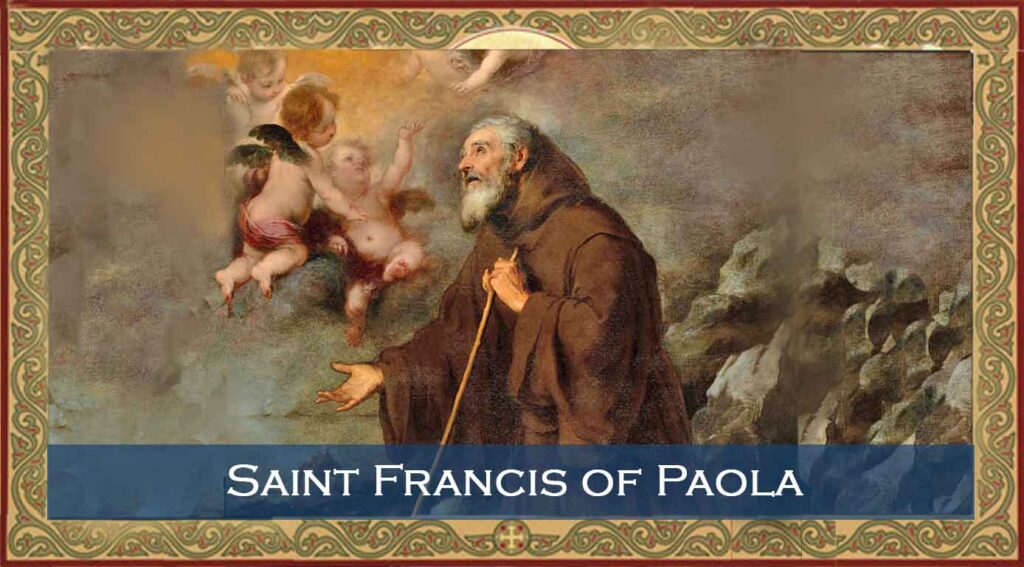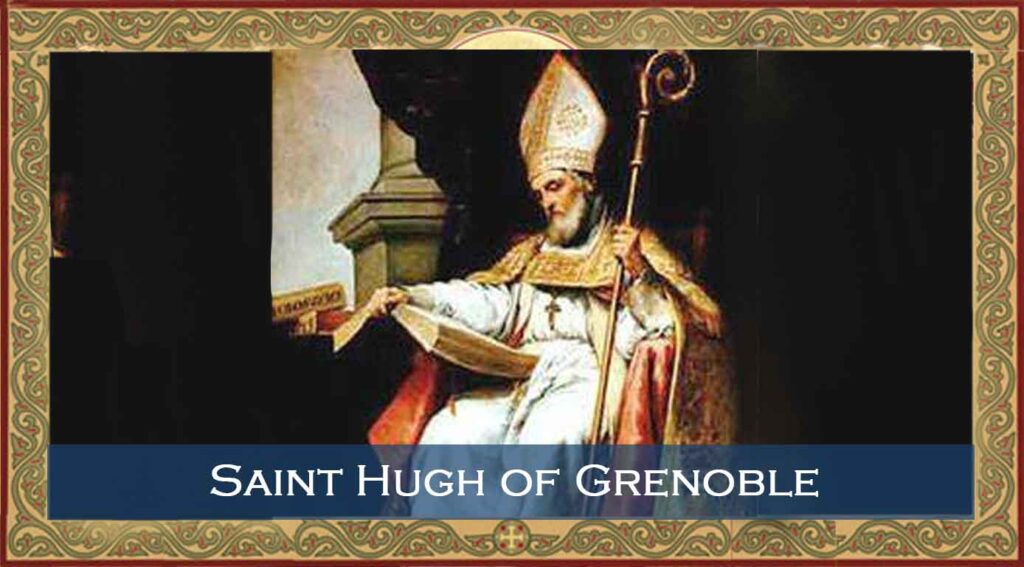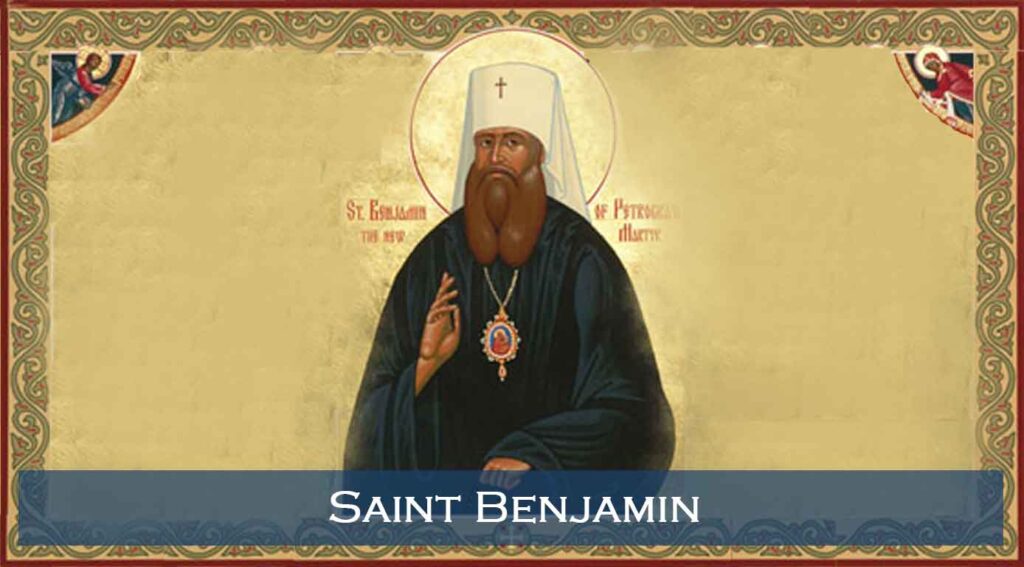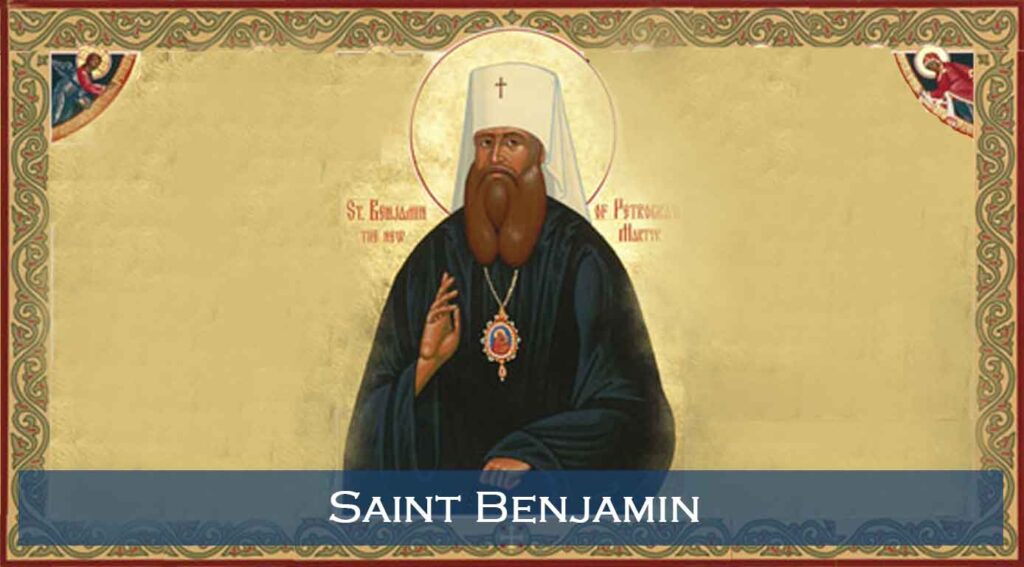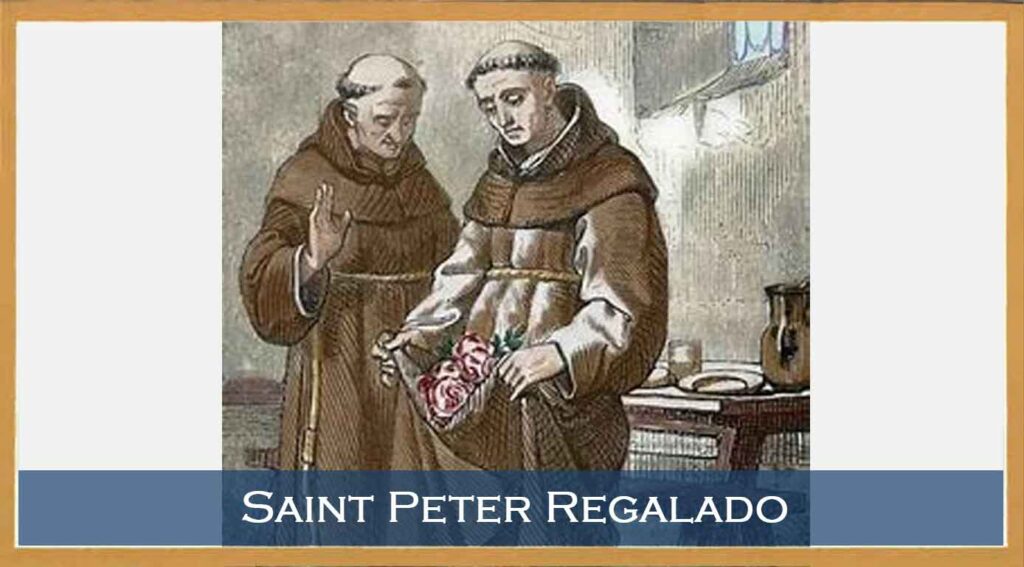Author name: sanjose
Saint Francis of Paola
Saint Francis of Paola was an Italian mendicant friar and the founder of the Roman Catholic Order of Minims. He was born in the town of Paola, which lies in the southern Italian Province of Cosenza, Calabria.
In his youth he was educated by the Franciscan friars in Paola. At the age of 13, being admonished by a vision of a Franciscan friar, he entered a friary of the Franciscan Order to fulfill the vow made by his parents.
At the completion of the year he went with his parents on a pilgrimage to Assisi, Rome, and other places of devotion. Returning to Paola, he selected a secluded cave on his father’s estate and there lived in solitude; but later on he found an even-more secluded cave on the sea coast. Here he remained alone for about six years, giving himself to prayer and mortification.
By 1436, he and two followers began a movement that would become the foundation of the Hermits of Saint Francis of Assisi, which would later be renamed as the Minim friars. Their name refers to their role as the “least of all the faithful”. Humility was to be the hallmark of the brothers as it had been in Francis’ personal life. The rule of life adopted by Francis and his religious was one of extraordinary severity. He felt that heroic mortification was necessary as a means for spiritual growth. They were to seek to live unknown and hidden from the world.
The number of his disciples gradually increased, and about 1454, with the permission of Pyrrhus, Archbishop of Cosenza, Francis built a large monastery and church. In 1474 Pope Sixtus IV gave him permission to write a rule for his community, and to assume the title of Hermits of St. Francis.
Saint Francis of Paola established monasteries of nuns, and a third order for people living in the world, after the example of Francis of Assisi. He was no respecter of persons based solely on their worldly rank or position. He rebuked the King of Naples for his ill-doing and in consequence suffered persecution.
Source:
https://en.wikipedia.org/wiki/Francis_of_Paola
"CATHOLIC ENCYCLOPEDIA: St. Francis of Paula". www.newadvent.org.
"St. Francis of Paola". Catholic News Agency.
Saint Francis of Paola Read More »
1 John 4:15
Verse:
“If anyone acknowledges that Jesus is the Son of God, God lives in them and they in God.” - 1 John 4:15
Saint Hugh of Grenoble
Saint Hugh of Grenoble, also called as Hugh of Châteauneuf, was born at Châteauneuf-sur-Isère, County of Albon. Even at a young age, he already showed piety and theological facility.
While still a layman, Saint Hugh of Grenoble was made a canon of Valence. In 1080, he was elected bishop of Grenoble, though he was not yet ordained. The See of Grenoble had fallen into a very poor state and Saint Hugh was selected to be its Gregorian renovator. Upon his return, he immediately set to the task of reforming the abuses in his new diocese. When he had succeeded in countering abuse and fostering devotion after two years, he tried to resign his bishopric and enter the Benedictine monastery at Cluny. However, the Pope ordered him to continue his episcopal work.
Saint Hugh was also instrumental in the foundation of the Carthusian Order. He received Bruno of Cologne, perhaps his own teacher, and six of his companions in 1084, after seeing them under a banner of seven stars in a dream. Saint Hugh installed the seven in a snowy and rocky Alpine location called Chartreuse. They founded a monastery and devoted their lives to prayer and study, being oft visited by Hugh, who was reported to have adopted much of their way of life. He also founded the nearby Monastère de Chalais, which grew into an independent order.
Source:
https://en.wikipedia.org/wiki/Hugh_of_Ch%C3%A2teauneuf
Herbermann, Charles, ed. (1913). Catholic Encyclopedia. Robert Appleton Company.
"Histoire de l'Ordre de Chalais". Fédération des abbayes chalaisiennes. Archived from the original on 2014-05-12.
Saint Hugh of Grenoble Read More »
Saint Benjamin
Saint Benjamin was a deacon martyred circa 424 in Persia. He was imprisoned for a year for his Christian faith, and later released with the condition that he abandon preaching or speaking of his religion. His release was obtained by the Eastern Roman Emperor Theodosius II through an ambassador. However, Saint Benjamin declared that it was his duty to preach about Christ and that he could not be silent. As a consequence, Benjamin was tortured mercilessly until his death in the year 424, specifically, “sharpened reeds [were] stuck under the nails of his fingers and toes.”
According to his hagiography, when the king was apprised that Saint Benjamin refused to stop preaching, he “… caused reeds to be run in between the nails and the flesh, both of his hands and feet, and to be thrust into other most tender parts, and drawn out again, and this to be frequently repeated with violence. Lastly, a knotty stake was thrust into his bowels, to rend and tear them, in which torment he expired….”
Saint Benjamin was executed during a period of persecution of Christians that lasted forty years and through the reign of two Persian kings: Isdegerd I, who died in 421, and his son and successor, Varanes V. King Varanes carried on the persecution with such great fury that Christians were submitted to the most cruel tortures.
Source:
https://en.wikipedia.org/wiki/Benjamin_the_Deacon_and_Martyr
Shea, John Dawson Gilmary. “Saint Benjamin, Deacon, Martyr”. Pictorial Lives of the Saints, 1889. CatholicSaints.Info. 6 February 2014
nto his urethra, by this account: Collin (1738), p.57, the stake finally thrust up his anus was studded with sharp nails according to the same source, * Collin, Johann E. (1738). Der Kampff und Sieg der ersten Blut-Zeugen Jesu Christi: durch Glauben und Gedult, nach alphabetischer Ordnung entworffen, und in Kupffern vorgestellet. Frankfurt and Leipzig.
Matthew 16:18
Verse:
And I tell you that you are Peter, and on this rock I will build my church, and the gates of Hades will not overcome it.
Isaiah 54:17
Verse:
“No weapon forged against you will prevail, and you will refute every tongue that accuses you. This is the heritage of the servants of the Lord, and this is their vindication from me,” declares the Lord.” - Isaiah 54:17
Prayer For God’s Promise Of Peace
Times are hard Lord Jesus, and my soul is getting troubled and afraid, and yet I know You told us never to be dismayed or troubled. Keep me I pray from thoughts that vex my mind, for I know Lord that they are destructive to my soul and serve no positive purpose.
Lord Jesus, I know that only You can bring true peace to our troubled hearts. Thank You for the precious gift of peace that You have promised to Your children. Your peace is so different from what the world has to offer - You have promised that You will keep all in perfect peace whose mind is stayed on You. Keep the eyes of my heart firmly fixed on my Lord Jesus.
I ask this prayer in the name of Jesus Christ, my Saviour,
Amen.
Saint Peter Regalado
Saint Peter Regalado lived at a very busy time in history. The Great Western Schism (1378-1417) was settled at the Council of Constance (1414-1418). France and England were fighting the Hundred Years’ War, and in 1453, the Byzantine Empire was completely wiped out by the loss of Constantinople to the Turks. At Peter’s death, the age of printing had just begun in Germany, and Columbus’s arrival in the New World was less than 40 years away.
Saint Peter came from a wealthy and pious family in Valladolid, Spain. At the age of 13, he was allowed to enter the Conventual Franciscans. Shortly after his ordination, he was made superior of the friary in Aguilar. He became part of a group of friars who wanted to lead a life of greater poverty and penance. In 1442, he was appointed head of all the Spanish Franciscans in his reform group.
Saint Peter Regalado led the friars by his example. A special love of the poor and the sick characterized Peter. Miraculous stories are told about his charity to the poor. For example, the bread never seemed to run out as long as Peter had hungry people to feed. Throughout most of his life, Peter went hungry; he lived only on bread and water.
Immediately after his death on March 30, 1456, his grave became a place of pilgrimage. Saint Peter Regalado was canonized in 1746.
Source:
https://www.franciscanmedia.org/saint-of-the-day/saint-peter-regalado/
Saint Peter Regalado Read More »
Psalm 19:14
Psalm 19:14erse:
“May these words of my mouth and this meditation of my heart be pleasing in your sight, Lord, my Rock and my Redeemer.” - Psalm 19:14
A Prayer For Strong Love For God
O Lord, when you said to your disciples, “One of you shall betray Me, they each asked, “Lord, is it I?” I pray, O God, for a love so strong that I will never betray Thee.
Amen.



